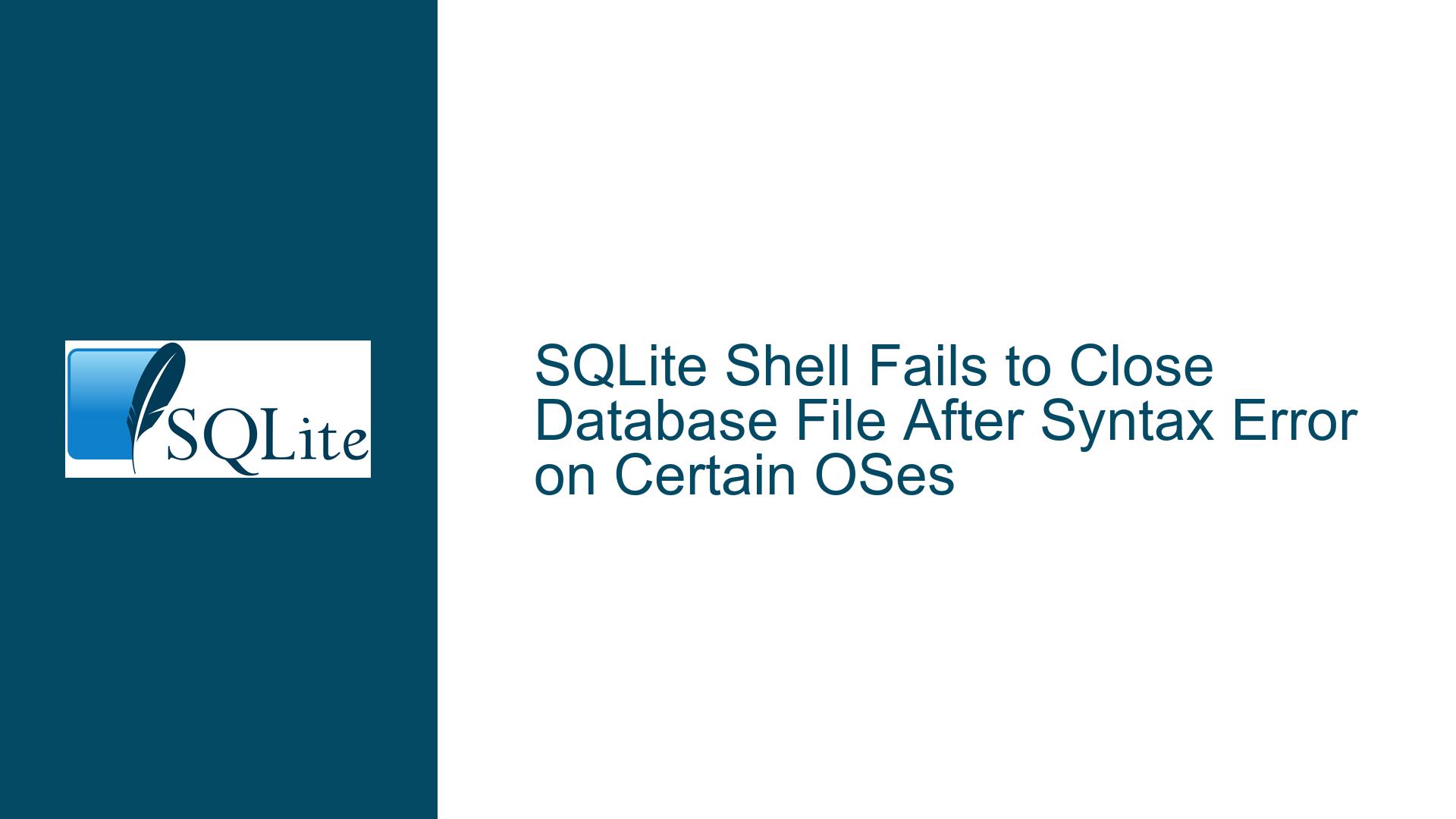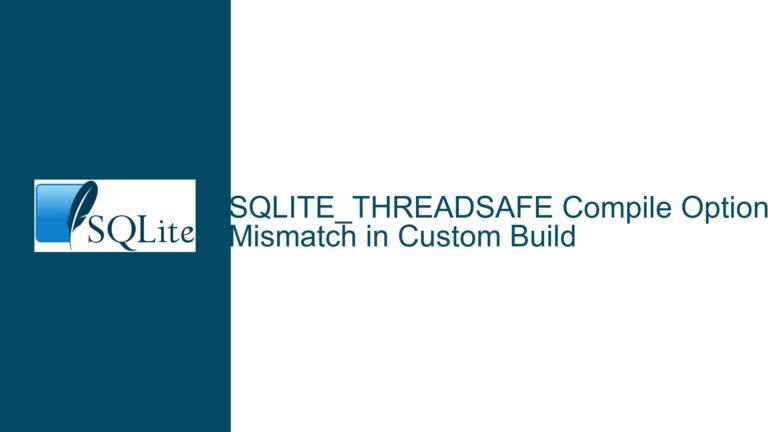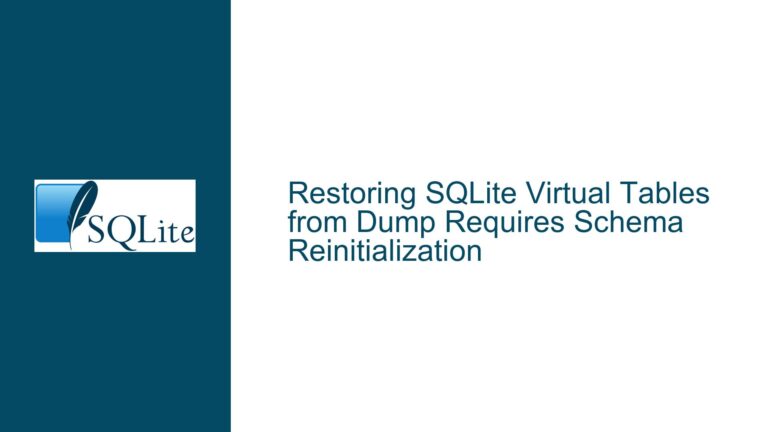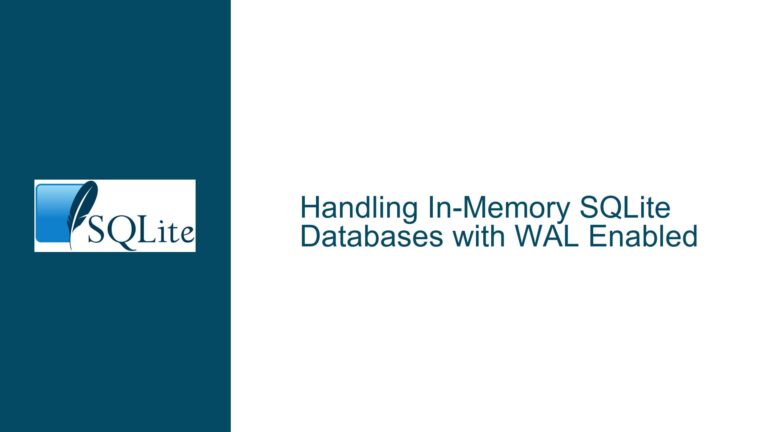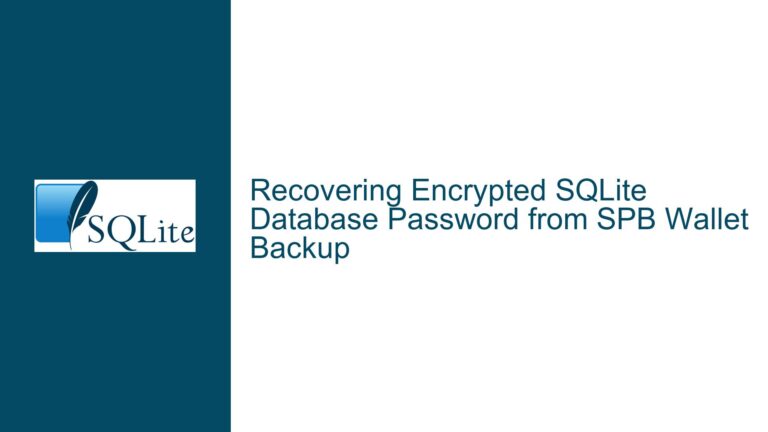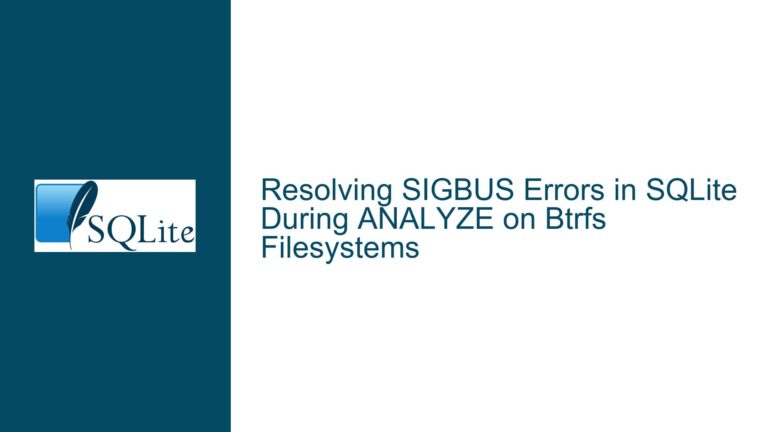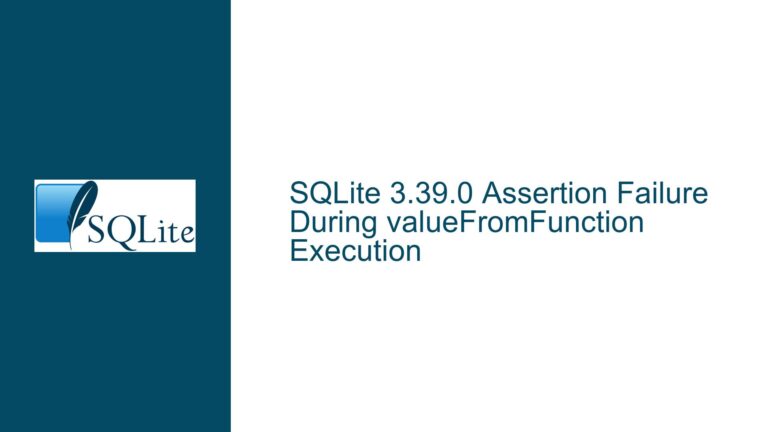SQLite Shell Fails to Close Database File After Syntax Error on Certain OSes
Database File Remains Open After Command-Line Syntax Error in SQLite Shell
Observed Behavior: SQLite Shell Retains Open Database Handle After Early Exit
When executing invalid SQL via the SQLite command-line shell (e.g., sqlite3 DB "Crash"), the shell exits with a syntax error but leaves the database file ("DB") open under specific operating systems, notably RISC OS. This behavior contrasts with mainstream systems like macOS, where the operating system reliably closes open file handles upon application termination. The issue arises from how the SQLite shell manages database connections during early exits caused by SQL parsing or execution errors. Analysis of the SQLite shell source code (shell.c) reveals that the open_db function initializes a database connection, but error paths may bypass subsequent cleanup routines that would normally close the connection. This creates a dependency on the host OS to enforce file handle cleanup, which is not universally guaranteed.
The problem manifests in environments where the operating system does not strictly enforce closure of file handles when processes terminate abnormally or exit without explicit cleanup. In such cases, the database file remains locked or marked as "in use," preventing subsequent access until the handle is released. This behavior has been observed in RISC OS, an operating system with non-POSIX-compliant file management semantics. The SQLite shell’s reliance on the OS to close database connections introduces platform-specific fragility, particularly in edge-case error scenarios.
Key technical details include:
- Code Flow in SQLite Shell: The shell’s
mainfunction callsopen_dbto establish a database connection. If SQL execution fails (e.g., due to a syntax error), the shell exits early via areturnstatement, bypassing theclose_dblogic located further down in the cleanup section. - OS-Specific File Handle Management: Operating systems like macOS, Linux, and Windows adhere to POSIX or similar standards, ensuring that all open file handles are closed when a process exits. RISC OS, however, exhibits divergent behavior, failing to release these handles reliably.
- Impact on Concurrent Access: An open database handle prevents other processes (or subsequent shell instances) from modifying the database, leading to "database is locked" errors or inconsistent read/write states.
Root Causes: Error Handling Gaps and OS Resource Management Discrepancies
The failure to close the database file stems from two interrelated factors:
Incomplete Error-Handling Paths in SQLite Shell
The SQLite shell’s command execution logic prioritizes immediate termination upon encountering errors, omitting explicit closure of database connections in certain code branches. For example, when invalid SQL is provided via the command line, the shell callsopen_dbbut exits via an earlyreturnstatement (line 23427 in shell.c) before reaching theclose_dbfunction. This design assumes the operating system will clean up resources, which holds true for most platforms but fails on systems with nonstandard file management.Non-Compliant OS File Handle Cleanup
RISC OS does not adhere to the POSIX requirement that all open file descriptors be closed automatically when a process terminates. This deviation creates a resource leak when applications rely on the OS for cleanup. While most modern operating systems enforce this contract rigorously, legacy or niche systems like RISC OS may leave handles open, requiring explicit closure within the application.Ambiguity in Shell’s Resource Ownership Model
The SQLite shell’s architecture implicitly assumes that a single database connection is active at any time, managed by a globalsqlite3*handle. However, error paths that bypass the shell’s cleanup routines leave this global handle unresolved, creating a dangling reference. This violates the principle of resource ownership, where the entity responsible for opening a resource (the shell) should also ensure its closure, regardless of execution flow.
Resolution: Explicit Database Closure and Platform-Specific Workarounds
To resolve the issue, modify the SQLite shell’s error-handling logic to explicitly close the database connection before exiting. This ensures platform-agnostic resource cleanup and eliminates reliance on OS-specific behavior.
Step 1: Identify Error Paths Bypassing Cleanup
In shell.c, trace code paths where errors trigger early exits. For example:
- After
open_dbsucceeds but SQL execution fails. - When command-line arguments specify an invalid database or query.
Locate all return, exit, or abort statements that occur after open_db but before close_db.
Step 2: Inject close_db Calls in Error Branches
Modify the shell’s source code to invoke close_db before exiting in these paths. For instance:
// Original code (simplified):
if( open_db(&data, 0) ) return 1;
if( process_input(&data) ) return 1; // Early exit on error
close_db(&data);
return 0;
// Modified code:
if( open_db(&data, 0) ) return 1;
if( process_input(&data) ) {
close_db(&data); // Explicit closure before exit
return 1;
}
close_db(&data);
return 0;
Step 3: Validate Across Target Platforms
Recompile the shell and test on RISC OS and other platforms to confirm that:
- The database file is closed after both successful and erroneous executions.
- No regressions occur in environments where the OS already handles cleanup.
Step 4: Conditional Compilation for Niche OSes (Optional)
For broader compatibility, use preprocessor directives to enable explicit closure only on platforms known to require it:
#ifdef __riscos__
close_db(&data);
#endif
Step 5: Leverate OS-Specific File Locking Diagnostics
Use tools like lsof (Unix-like systems) or proprietary RISC OS utilities to verify that database handles are released. For example:
# On Unix-like systems:
lsof | grep DB
Alternative Solution: Signal Handlers for Abnormal Termination
Register signal handlers to close the database connection during fatal errors (e.g., SIGSEGV, SIGABRT). This approach is more complex but ensures cleanup even in crash scenarios:
#include <signal.h>
void cleanup_handler(int sig) {
close_db(&data);
exit(1);
}
int main() {
signal(SIGABRT, cleanup_handler);
signal(SIGSEGV, cleanup_handler);
// ... rest of main ...
}
Long-Term Fix: Upstream Code Contribution
Submit a patch to the SQLite project’s official repository, ensuring all error paths in the shell explicitly close database connections. This benefits users across niche platforms and reinforces the shell’s robustness.
By addressing error-handling gaps and eliminating reliance on OS-specific resource management, developers can ensure consistent database closure across all platforms. This approach aligns with best practices for resource ownership and fault tolerance in cross-platform software development.
